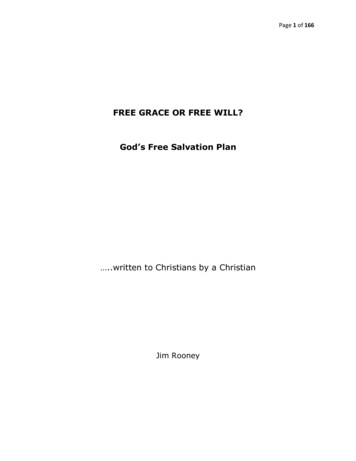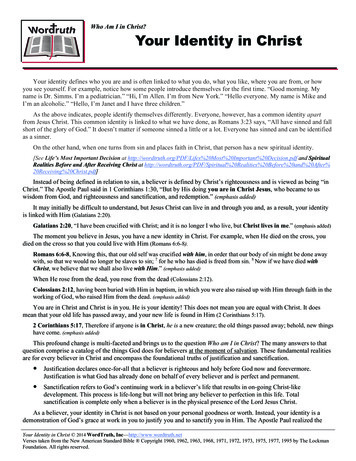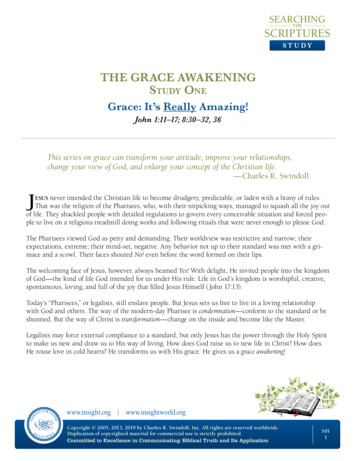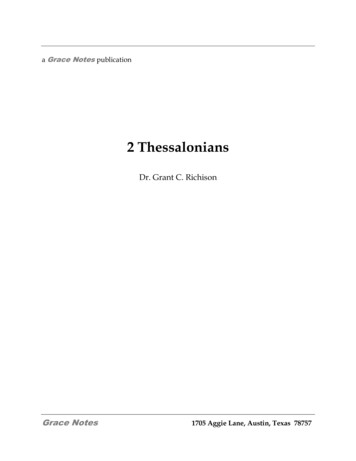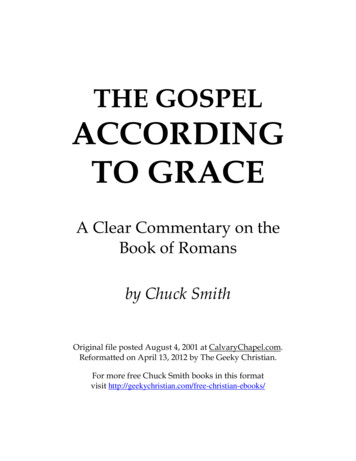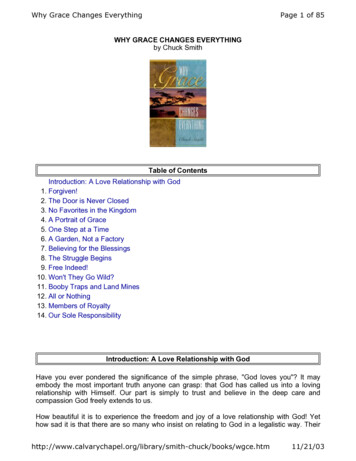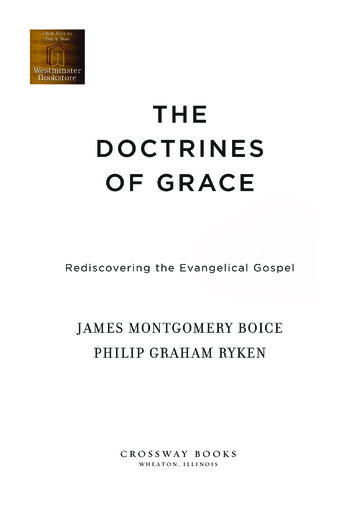
Transcription
DoctrinesOfGrace.11288.int.qxd2/23/092:19 PMPage 3ClickHeretoBuyitNowWestminsterBookstoreC R O S S W AY B O O K SWHEATON, ILLINOIS
DoctrinesOfGrace.11288.int.qxd2/23/092:19 PMPage 4The Doctrines of GraceOriginal edition copyright 2002 by Linda McNamara Boice andPhilip Graham RykenPublished by Crossway Booksa publishing ministry of Good News Publishers1300 Crescent StreetWheaton, Illinois 60187All rights reserved. No part of this publication may be reproduced, stored in aretrieval system, or transmitted in any form by any means, electronic,mechanical, photocopy, recording, or otherwise, without the prior permissionof the publisher, except as provided by USA copyright law.Cover design: Chris TobiasFirst printing, trade paper, 2009Printed in the United States of AmericaUnless otherwise noted, Scripture is from The Holy Bible: New InternationalVersion. Copyright 1973, 1978, 1984 by International Bible Society.Used by permission of Zondervan Publishing House. All rights reserved.The “NIV” and “New International Version” trademarks are registered in theUnited States Patent and Trademark Office by International Bible Society.Use of either trademark requires the permission of International Bible Society.Scripture references marked RSV are from the Revised Standard Version.Copyright 1946, 1952, 1971, 1973 by the Division of Christian Educationof the National Council of the Churches of Christ in the U.S.A.Scripture references marked KJV are from the King James Version of the Bible.ISBN: 978-1-4335-1128-8PDF ISBN: 978-1-4335-0946-9Mobipocket ISBN: 978-1-4335-0947-6Library of Congress Cataloging-in-Publication DataBoice, James Montgomery, 1938–2000The doctrines of grace : rediscovering the evangelical gospel/ James Montgomery Boice, Philip Graham Ryken.p.cm.Includes bibliographical references and index.ISBN 13: 978-1-58134-299-4ISBN 10: 1-58134-299-3 (HC : alk. paper)1. Calvinism. 2. Grace (Theology) I. Ryken, Philip Graham, 1966–II. Title.BX9422.3 615149871361251141032091
DoctrinesOfGrace.11288.int.qxd2/23/092:19 PMPage 9F o re w o rd8Ihearhavea prognosisoften wondered how my ministry would change if I were tofrom my physician that I had a terminal disease andonly months or weeks left to live. Would I retire from active ministryto care solely for my own needs? Would I try to continue ministry witha renewed sense of urgency? Would my messages be more bold?I don’t know the answers to these questions. But I do know whatJim Boice did when the above scenario became real to him. From theday he learned he was dying of cancer to his actual demise, the span oftime was a mere six weeks. Forty-two days. The last two of those weekshe was bedridden and extremely weak. While the virulent disease wassapping his strength daily, Dr. Boice called upon a reservoir of strengthin his own soul, a strength quickened and sustained by the grace of God,to continue writing hymns and this present volume. He did not live longenough to see this work completed but was encouraged by the assurance that his colleague Dr. Philip Ryken would complete it for him.As familiar as I am with Jim Boice’s style and content, on a firstreading I could not detect where Jim’s writing ended and Phil’s began.Of one thing I was sure: Jim did not write the last chapter. Yet in an earlier draft of chapter 2, in the midst of a treatment of Abraham Kuyper,reference was made to Kuyper’s famous Stone Lectures at PrincetonUniversity in 1898. This reference was followed by the comment: “Weshall return to the subject of these lectures in our final chapter.” WhenI read this comment I wondered to whom the “we” and “our” referred.Was the plural used as a result of editing that occurred after Dr. Boice’sdeath, indicating the joint project with Dr. Ryken? Or was this merelya case of Dr. Boice employing the editorial “we”? In the event, it wasnot God’s will for Jim to pen the chapter promised.It is no surprise to me that this final work from Jim Boice, whowrote literally scores of books over the course of his ministry, should
DoctrinesOfGrace.11288.int.qxd102/23/092:19 PMPage 10THE DOCTRINES OF GRACEfocus on the doctrines of grace. Here was a man who not only believedin the doctrines of grace but also loved those doctrines and had fire inhis bones about propagating them. I knew Jim Boice for more than thirtyyears and never saw that fire diminish. His soul was held captive by thedoctrines of grace. His ministry was an ongoing doxology to the doctrines of grace because they so clearly manifest the God of that grace.In this book Drs. Boice and Ryken not only provide a lucid andcompelling exposition of the doctrines of grace but also provide a historical framework for their development. The book traces the historicalimpact of these biblical truths. It also makes bare the sad state of affairsthat afflicts the church when these doctrines are denied or neglected.In our day there remain many who still confess their belief in thedoctrines of grace in particular and Reformed theology in general.Indeed, I think there are more academic institutions in America todaythat embrace Reformed theology than at any time in our nation’s history. However, there are few that have a zeal and passion to propagatethat faith.James Montgomery Boice was not merely an adherent ofReformed theology or an admirer of the magisterial Reformers; he washimself a Reformer. His ministry at Tenth Presbyterian Church; thePhiladelphia Conference on Reformed Theology; his writing ministry;his care for the inner city of Philadelphia; his statesmanship as anational Christian leader—all of these expressions of service flowedout of his love for the Reformed faith.It is not surprising that the last literary work of James Boice wouldfocus on his first love, the doctrines of grace. This work is not simplya tribute to Dr. Boice and his ministry—it is, at its core, a tribute tothe grace of God, to whom belongs all the glory for our redemption.As Dr. Boice now enjoys the felicity of his eternal rest, we are left towork for the recovery of the Reformed faith in our time.R. C. SproulLent, 2001Orlando, Florida
DoctrinesOfGrace.11288.int.qxd2/23/092:19 PMPage 11P re f a c e8James Boice liked to finish what he started, so it is not surprising thatin his final months he was working to complete two major projects.One was a book of Hymns for a Modern Reformation. The other was thepresent volume—a biblical, theological, historical, and practical presentation of the doctrines of grace.When it became apparent that Dr. Boice would be unable to complete either of these projects himself, he entrusted them to colleagueson the staff of Philadelphia’s Tenth Presbyterian Church. Dr. PaulJones had written the music for the hymns, so it was natural for himto prepare the hymnal for publication. Then, during our last staffmeeting together at the church before his death in June of 2000, Dr.Boice asked me to finish writing The Doctrines of Grace.Fortunately, the volume was already half written. Not only had Dr.Boice prepared a complete outline for the book and determined thethesis for each chapter, but he had also written a full draft of the fivechapters on the Five Points of Calvinism. These chapters form themiddle section of the book (chapters 3 through 7). Here my only contributions have been some light stylistic editing and several smalladditions that integrate this section with the rest of the book.Dr. Boice and I only had time for one brief discussion about thechapters that remained to be written. However, I was delighted to discover that for each of these chapters he had left behind notes containing ideas that he wanted to emphasize, quotations he hoped to use,books he intended to consult, and so forth. I have used as much of thismaterial as possible, incorporating it into the overall flow of the book.Chapter 1 is an introduction to the doctrines of grace. The sections entitled “The Doctrines of Grace,” “The Five Points ofArminianism,” and “The Five Points of Calvinism,” are partly adapted
DoctrinesOfGrace.11288.int.qxd122/23/092:19 PMPage 12THE DOCTRINES OF GRACEfrom material Dr. Boice prepared for the New Members class at TenthChurch. As indicated in the text itself, “Today’s False Gospel” is a summary of his argument in Whatever Happened to the Gospel of Grace?which was published by Crossway in 2001.The main thesis of chapter 2 is the one that Dr. Boice wanted toadvance, namely, that Calvinism is good for the church, and that itsabandonment generally leads to liberalism. Also, the examples givenare the ones that he intended to use: Calvin, Edwards, and Kuyper. Inkeeping with a suggestion I made to him in an earlier conversation, Ihave added a section on the Puritans. The closing analysis of currenttrends in evangelical theology is entirely my own, although I believeit is thoroughly consonant with Dr. Boice’s views.In some ways chapter 8 is the most important chapter in the book.James Boice wanted to portray the kind of Christianity that, in my view,he so ably represented: biblically based, theologically rigorousCalvinism that is also practically minded and kindly hearted. In accordance with the notes that were left for me, the chapter’s basic outlinecomes from Al Martin’s booklet The Practical Implications of Calvinism.I have done my best to convey what Dr. Boice so earnestly wanted toconvey: the warmth and vitality of true Reformed spirituality.The notes for chapter 9 were less extensive. Dr. Boice planned todraw from Kuyper’s Lectures on Calvinism, but it was left for me todevelop the implications of Reformed theology for church and culture.However, the final appeal to make a personal response to the doctrinesof grace comes from Dr. Boice himself.Readers will find that this is a polemical book. By this I mean thatit argues for a theological position—Calvinism as set over againstArminianism. It is our conviction that evangelicalism is in desperateneed of the best kind of Calvinism. It was Dr. Boice’s intention for thisbook to mount a vigorous defense of Reformed theology while at thesame time maintaining the highest standards of Christian charity. Thishas also been my intention. Readers will have to judge for themselveshow well we have succeeded, which leads me to emphasize that whileI wish to give my late colleague full acknowledgment for his part inwriting this book, I also accept full responsibility for all of its shortcomings.
DoctrinesOfGrace.11288.int.qxd2/23/092:19 PMPrefacePage 1313Many friends helped to complete this project. Randall Grossman,Michael Horton, Mark Noll, Richard Phillips, Jonathan Rockey, LelandRyken, and R. C. Sproul reviewed the manuscript and made helpfulsuggestions for its improvement. Dr. Boice’s personal assistant, MaryBeth McGreevy, made corrections for style, and Patricia Russell helpedprepare the indexes. I am grateful to the session of Tenth PresbyterianChurch for allowing sufficient study time to complete the book duringthe month prior to my installation as senior minister. I also thank Gregand Mary Berzinsky for providing a place for me to work free from distraction. Finally, here I express publicly what I communicated to JamesMontgomery Boice privately: thanksgiving to God for the extraordinary privilege of sharing with him in the preaching ministry of TenthChurch and of joining him in the defense of biblical orthodoxy.Earlier I mentioned that Dr. Boice wrote Hymns for a ModernReformation. Appropriate stanzas from these hymns appear at thebeginning of each chapter. The complete hymns have been publishedby Tenth Presbyterian Church; hymnals and recordings may beordered through the Alliance of Confessing Evangelicals atwww.AllianceNet.org.Philip Graham RykenMemorial Day, 2001Philadelphia
DoctrinesOfGrace.11288.int.qxd2/23/092:19 PMPage 17O N E8Why EvangelicalismNeeds CalvinismHow marvelous, how wise, how great,How infinite to contemplate:Jehovah’s saving plan.He saw me in my lost estateYet purposed to regenerateThis faithless, fallen man.The world should realize with increased clearness that Evangelical-ism stands or falls with Calvinism.”1 The great Princeton theologianBenjamin Breckinridge Warfield wrote those words a century ago. Atthe time, Calvinism still had a major influence on evangelicalism,helping to define its theology, shape its spirituality, and clarify its mission. That is no longer as true as it once was. Increasingly Calvinismis defined over against evangelicalism, and while many Calvinists stillconsider themselves evangelicals, most evangelicals are suspicious ofCalvinism.On a first reading, therefore, Warfield’s claim seems excessive, andprobably false. One doubts whether it would find widespread acceptance in the contemporary church. What has Calvinism to do withevangelicalism? And why would the vitality of the evangelical churchin any way depend on Calvinist theology?As surprising as it may seem, Warfield’s claim is the thesis of this
DoctrinesOfGrace.11288.int.qxd182/23/092:19 PMPage 18THE DOCTRINES OF GRACEbook, namely, that evangelicalism stands or falls with Calvinism. Toput this in a slightly less provocative way, evangelicalism needsCalvinism. In order to see why this is so, it helps to remove the labels.By “Evangelicalism,” Warfield essentially meant what GermanLutherans meant when they first started using the term during theProtestant Reformation: a church founded on the gospel, the goodnews of salvation through the death and resurrection of Jesus Christ.And when Warfield spoke of “Calvinism,” he was referring to theProtestant Reformation, with its insistence on justification by gracealone, through faith alone, because of Christ alone. To put it more simply, evangelicalism stands for the gospel and Calvinism stands forgrace. What Warfield was really saying, therefore, is something thatevery Christian should and must believe: the gospel stands or falls bygrace. As Warfield recognized, the gospel is not really the gospelunless it is a gospel of grace; in other words, the gospel is only goodnews if it announces what God has done to save sinners. And if that istrue, then the gospel stands or falls with the doctrines of grace.THE DOCTRINESOFGRACEThe doctrines of grace—these words are shorthand for five distinctBible teachings that were linked together in response to the theologythat developed in Holland in the late sixteenth century. This theologywas associated with the name of Jacob Arminius (1560–1609).Arminius and his followers stressed the free and therefore self-determining will of man, which led them by a logical process to deny JohnCalvin’s (1509–1564) doctrine of strict predestination, and especiallythe teaching that Jesus died only for the elect, those whom God hadchosen. The Synod of Dort (1618–1619) was called to respond to thetheological deviations of the Arminians, and from it came The Canonsof the Synod of Dort, containing the classical summation of the fivedoctrines of grace known today as TULIP, or “The Five Points ofCalvinism.”TULIP is an acrostic, the letters of which stand for the doctrinesthat were most in dispute: Total depravity, Unconditional election,Limited atonement, Irresistible grace, and the Perseverance of the
DoctrinesOfGrace.11288.int.qxd2/23/092:19 PMPage 19Why Evangelicalism Needs Calvinism19saints. These are not the wisest or the most accurate ways of speakingabout these doctrines; however, they are the most common way, andthe acronym is a convenient handle for remembering them. Thesedoctrines are important because they take confidence away from anyspiritual good that might be thought to reside in man and insteadanchor it in the will and power of God alone.Although these doctrines constitute the purest expression ofCalvinism, Calvin did not invent them, nor were they characteristicof his thought alone during the Reformation period. These truths arecontained in the Old Testament Psalms. They were taught by Jesus,even to his enemies, as recorded in John 6 and 10 and elsewhere. Theapostle Paul confirmed them in his letters to the Romans, theEphesians, and others. Saint Augustine argued for the same truthsover against the denials of Pelagius. Martin Luther was in many waysa Calvinist (as, in important respects, Calvin was a Lutheran). So wereUlrich Zwingli and William Tyndale. For this reason, it is perhapsmore accurate to describe this theology as “Reformational” rather than“Calvinist.” The Puritans were Reformed theologians, too, and it wasthrough their teaching that England and Scotland experienced someof the greatest and most pervasive national revivals the world has everseen. Among these Puritans were the heirs of the Scottish ReformerJohn Knox: Thomas Cartwright, Richard Sibbes, John Owen, JohnBunyan, Matthew Henry, Thomas Boston, and many others. InAmerica many thousands were influenced by Jonathan Edwards,Cotton Mather, and George Whitefield, all of whom were Calvinists.In more recent times the modern missionary movement receivedits direction and initial impetus from those in the Reformed tradition.The list of these pioneers includes such great missionaries as WilliamCarey, John Ryland, Henry Martyn, Robert Moffat, David Livingstone,John G. Paton, and John R. Mott. For all of these men, the doctrinesof grace were not merely an appendage to Christian thought; rather,these were the central doctrines that fueled their evangelistic fires andgave form to their preaching of the gospel.In short, the doctrines known as Calvinism did not emerge late inchurch history, but find their origins in the teaching of Jesus, whichhas been preserved throughout the church in many periods, and
DoctrinesOfGrace.11288.int.qxd202/23/092:19 PMPage 20THE DOCTRINES OF GRACEwhich has always been characteristic of the church at its greatest periods of faith and expansion. It follows from this that the evangelicalchurch will again see great days when these truths are widely and fearlessly proclaimed. If that is true, then nothing is more needed todaythan a recovery of precisely these doctrines: total depravity, unconditional election, limited atonement, irresistible grace, and the perseverance of the saints (or, as they are identified in this book, radicaldepravity, unconditional election, particular redemption, efficaciousgrace, and persevering grace). These gracious doctrines have beenprominent in the minds and hearts of God’s people in some of thechurch’s finest hours.T O D AY ’ S F A L S E G O S P E LSadly, this is not the church’s finest hour. We live in an age of weaktheology and casual Christian conduct. Our knowledge is insufficient,our worship is irreverent, and our lives are immoral. Even the evangelical church has succumbed to the spirit of this age. WhateverHappened to the Gospel of Grace?—the book that serves as a prologueto the present volume—argued that the evangelical movement has lostits grip on the gospel.2Perhaps the simplest way to say this is that evangelicalism hasbecome worldly. This can be demonstrated by comparing it with yesterday’s liberalism. What was once said of liberal churches must nowbe said of evangelical churches: they seek the world’s wisdom, believethe world’s theology, follow the world’s agenda, and adopt the world’smethods. According to the standards of worldly wisdom, the Bible isunable to meet the demands of life in these postmodern times. Byitself, God’s Word is insufficient to win people to Christ, promote spiritual growth, provide practical guidance, or transform society. Sochurches supplement the plain teaching of Scripture with entertainment, group therapy, political activism, signs and wonders—anythingthat promises to appeal to religious consumers. According to theworld’s theology, sin is merely a dysfunction and salvation means having better self-esteem. When this theology comes to church, it replacesdifficult but essential doctrines like the propitiation of God’s wrath
DoctrinesOfGrace.11288.int.qxd2/23/092:19 PMPage 21Why Evangelicalism Needs Calvinism21with practical techniques for self-improvement. The world’s agenda ispersonal happiness, so the gospel is presented as a plan for individualfulfillment rather than as a pathway of costly discipleship. The world’smethods for accomplishing this self-centered agenda are necessarilypragmatic, so evangelical churches are willing to try whatever seemslike it might work. This worldliness has produced the “new pragmatism” of evangelicalism.Another way to explain what is wrong with the evangelical churchis to identify major ideas in contemporary thought, and then seewhether they have made any inroads into the church. WhateverHappened to the Gospel of Grace? identified six major cultural trends:secularism, humanism, relativism, materialism, pragmatism, and antiintellectualism or “mindlessness.” Secularism is the view that the universe is all there is; God and eternity are excluded. Humanism is thebelief that—in the words of the ancient pagan philosophers—“Man isthe measure of all things.” This inevitably leads to the worship of self.Relativism teaches that because there is no God, there are no absolutes;truth is relative. Materialism is closely related to secularism. If nothing exists except the here-and-now, then the meaning of life can befound only in personal possessions. Pragmatism measures truth by itspractical utility. What is right and true is whatever works. Mindlessnessis the overall “dumbing down” of popular culture, the shrinking of theAmerican mind, which television has done a great deal to accelerate.Most people have short attention spans, especially when it comes todiscussing anything worthwhile or important. In the lyrics of one popular entertainer, “I’m not aware of too many things.”These are some of the prevailing trends in American culture at thedawn of the new millennium. If the church has become worldly, thenwe would expect to find these same attitudes in evangelical churches.And of course that is exactly what we do find. As surprising as it maysound, evangelicalism has become increasingly secular. In an effort tomake newcomers feel comfortable, pastors teach as little theology aspossible. Worship has become a form of popular entertainment ratherthan transcendent praise. New church buildings are designed to lookmore like office parks than houses of worship. All of these trends contribute to the secularization of what once was sacred.
DoctrinesOfGrace.11288.int.qxd222/23/092:19 PMPage 22THE DOCTRINES OF GRACEAt the same time, evangelical churches have become much morehumanistic. This is inevitable: the less we talk about God, the morewe talk about ourselves. Sermon content is determined more by theintended audience than by the sacred Scripture. This quickly leads torelativism in thought and conduct. Moral convictions are no longerdetermined by careful argument on the basis of biblical absolutes; theyare uninformed choices based on personal feelings. The church is alsomaterialistic. The evangelical attitude toward money is captured in thetitle of a book recently edited by Larry Eskridge and Mark Noll: MoreMoney, More Ministry.3 When financial prosperity becomes a significant priority, churches find themselves forced to figure out whatworks. This quest both derives from and results in the new pragmatism mentioned earlier. Most pastors want their churches to be biggerand better, but even if they are not better, it would be better if theywere bigger! Not surprisingly, their parishioners want to be healthierand wealthier, too. Behind all these worldly attitudes there lurks a pervasive mindlessness, an unwillingness to think very seriously aboutanything, but especially Christian doctrine. Evangelicalism hasbecome a religion of feeling rather than of thinking.So when we ask the question, “Whatever happened to the gospelof grace?” the answer turns out to be that many evangelical churcheshave exchanged godliness for worldliness. This happens in too manyways to count, but “The Cambridge Declaration” includes a helpfulsummary: “As evangelical faith has become secularized, its interestshave been blurred with those of the culture. The result is a loss of absolute values, permissive individualism, and a substitution of wholenessfor holiness, recovery for repentance, intuition for truth, feeling forbelief, chance for providence, and immediate gratification for enduring hope. Christ and his cross have moved from the center of ourvision.”4 What happened to the grace of the gospel? It was lost in thechurch study, when the minister decided to give his people what theywanted rather than what they needed. It was lost in the Christianbookstore, somewhere between the self-help section and the aisle fullof Jesus merchandise. And it was lost in our minds and hearts whenwe decided to accept the world’s theology of human achievement, saving room for our own personal contribution to salvation.
DoctrinesOfGrace.11288.int.qxd2/23/092:19 PMPage 23Why Evangelicalism Needs Calvinism23What has replaced the gospel of grace is a message that is partiallybiblical but ultimately self-centered. Like everything else in creation,the human soul abhors a vacuum. When something essential disappears from our theology and our spirituality, something else rushes into replace it. When God himself disappears, what replaces him is theself. To quote again from “The Cambridge Declaration,” “Unwarrantedconfidence in human ability is a product of the fallen human nature.This false confidence now fills the evangelical world—from the selfesteem gospel to the health and wealth gospel, from those who havetransformed the gospel into a product to be sold and sinners into consumers who want to buy, to others who treat Christian faith as beingtrue simply because it works.”One place to observe this misplaced confidence in human abilityis in the area of Christian witness, where a self-centered gospel hasproduced a self-absorbed evangelism. When evangelicals think ofevangelism, rather than thinking first of the gospel message they areprone to think of a particular response to that message. This perhapsexplains why testimonies of saving faith tend to emphasize personalexperience rather than the person and work of Jesus Christ. However,as J. I. Packer warned in his book Evangelism and the Sovereignty ofGod, there is an inherent danger in defining evangelism “in terms ofan effect achieved in the lives of others; which amounts to saying thatthe essence of evangelizing is producing converts.”5 Such an approachinevitably turns evangelism into another form of pragmatism.However, the essence of evangelism does not lie in the results; it restsin the message itself—the good news of salvation in the death and resurrection of Jesus Christ. This is not to say that the gospel messagedoes not demand a response. Of course it does. But that response isnot the work of the evangelist; it is the work of God, and this is mostclearly understood when the presentation of the gospel is groundedin the doctrines of grace.It is sometimes thought that the Five Points of Calvinism tend todull one’s passion for sharing the gospel. This view is mistaken, bothin its understanding of Calvinism and in its understanding of evangelism. The truth is exactly the opposite, namely, that the doctrines ofgrace establish the most solid foundation and provide the most endur-
DoctrinesOfGrace.11288.int.qxd242/23/092:19 PMPage 24THE DOCTRINES OF GRACEing motivation for the most effective proclamation of the gospel. Aswe shall see, only thoroughly biblical convictions about divine election, particular redemption, and irresistible grace give confidence thatthe gospel has the power actually to accomplish God’s saving purpose.One of the brightest examples of better evangelism throughCalvinism was the nineteenth-century preacher Charles HaddonSpurgeon. Spurgeon was one of the greatest evangelists England hasever seen, as well as one of the country’s staunchest defenders of thedoctrines of grace. He wrote:I have my own private opinion that there is no such thing aspreaching Christ and him crucified unless we preach whatis nowadays called Calvinism. It is a nickname to call itCalvinism; Calvinism is the Gospel and nothing else. I do notbelieve we can preach the Gospel . . . unless we preach thesovereignty of God in his dispensation of grace; nor unless weexalt the electing, unchangeable, eternal, immutable, conquering love of Jehovah; nor do I think we can preach theGospel unless we base it upon the special and particularredemption of his elect and chosen people which Christwrought out upon the cross; nor can I comprehend theGospel which allows saints to fall away after they are called.6If Spurgeon was right, then Warfield was right, too: evangelicalismstands or falls with Calvinism. Or to restate our thesis, the doctrinesof grace preserve the gospel of grace.THE FIVE POINTSOFARMINIANISMThe heart of this book is an exposition of the doctrines of grace fromHoly Scripture. But before giving a thorough biblical defense of thesedoctrines, it may prove useful to offer a brief overview summarizingthe theological issues at stake whenever we consider God’s grace in thegospel.Although the doctrines of grace have been taught throughout thehistory of the church, the so-called Five Points of Calvinism weredeveloped in response to the theology of Jacob Arminius. Arminiustaught systematic theology at the University of Leyden. In 1610, the
DoctrinesOfGrace.11288.int.qxd2/23/092:19 PMPage 25Why Evangelicalism Needs Calvinism25year after the professor died, his followers drew up five articles of faiththat summarized his understanding of salvation. The Arminians, asthey came to be called, presented these doctrines to the state ofHolland in the form of a protest (or Remonstrance), arguing that theDutch confessions should be amended to conform to their views. Hereare the five planks of their theological platform:Article I: That God, by an eternal unchangeable purpose inJesus Christ his Son, befo
books he intended to consult, and so forth. I have used as much of this material as possible, incorporating it into the overall flow of the book. Chapter 1 is an introduction to the doctrines of grace. The sec-tions entitled “The Doctrines of Grace,” “The Five Points of Arminia

